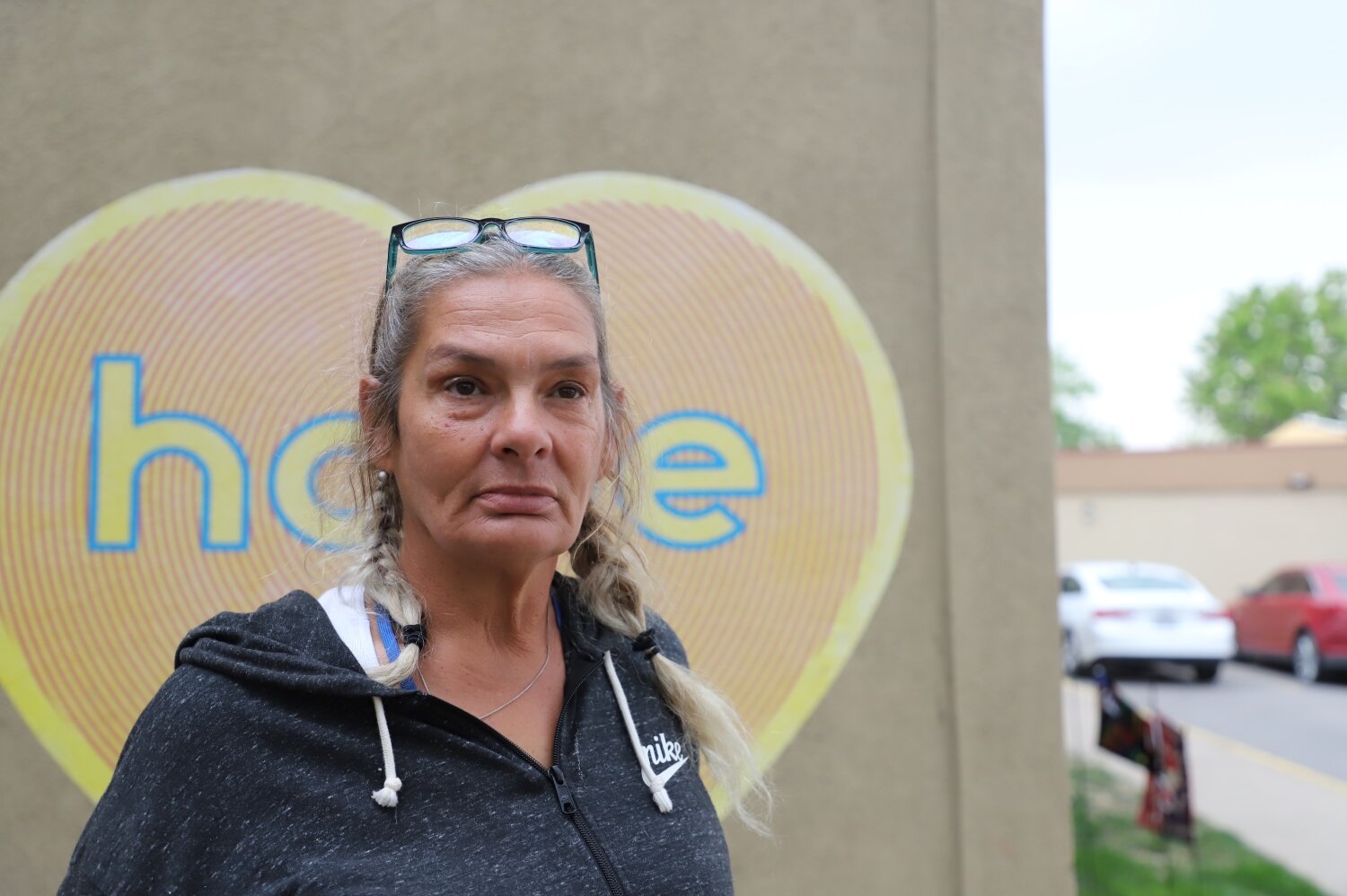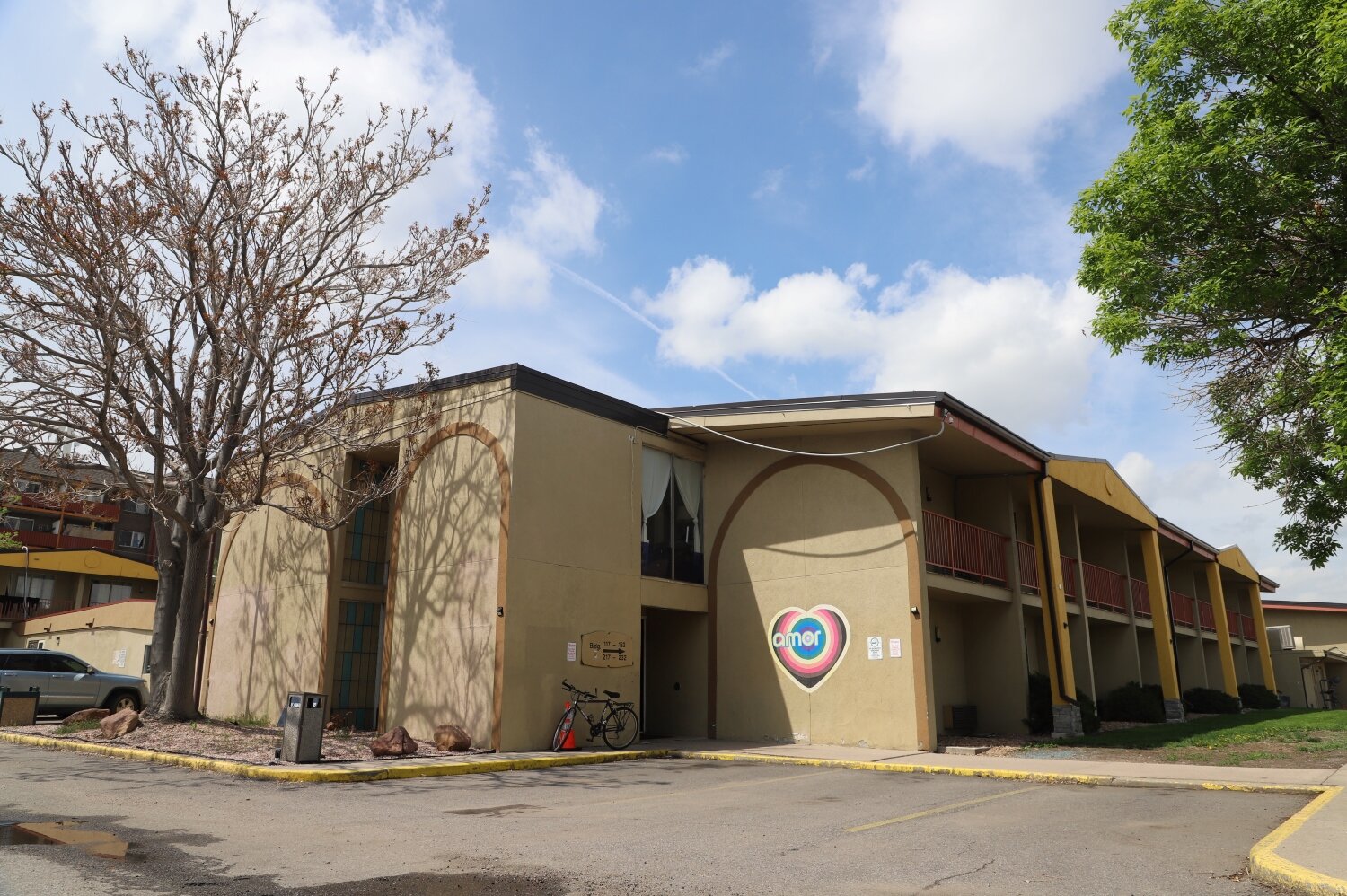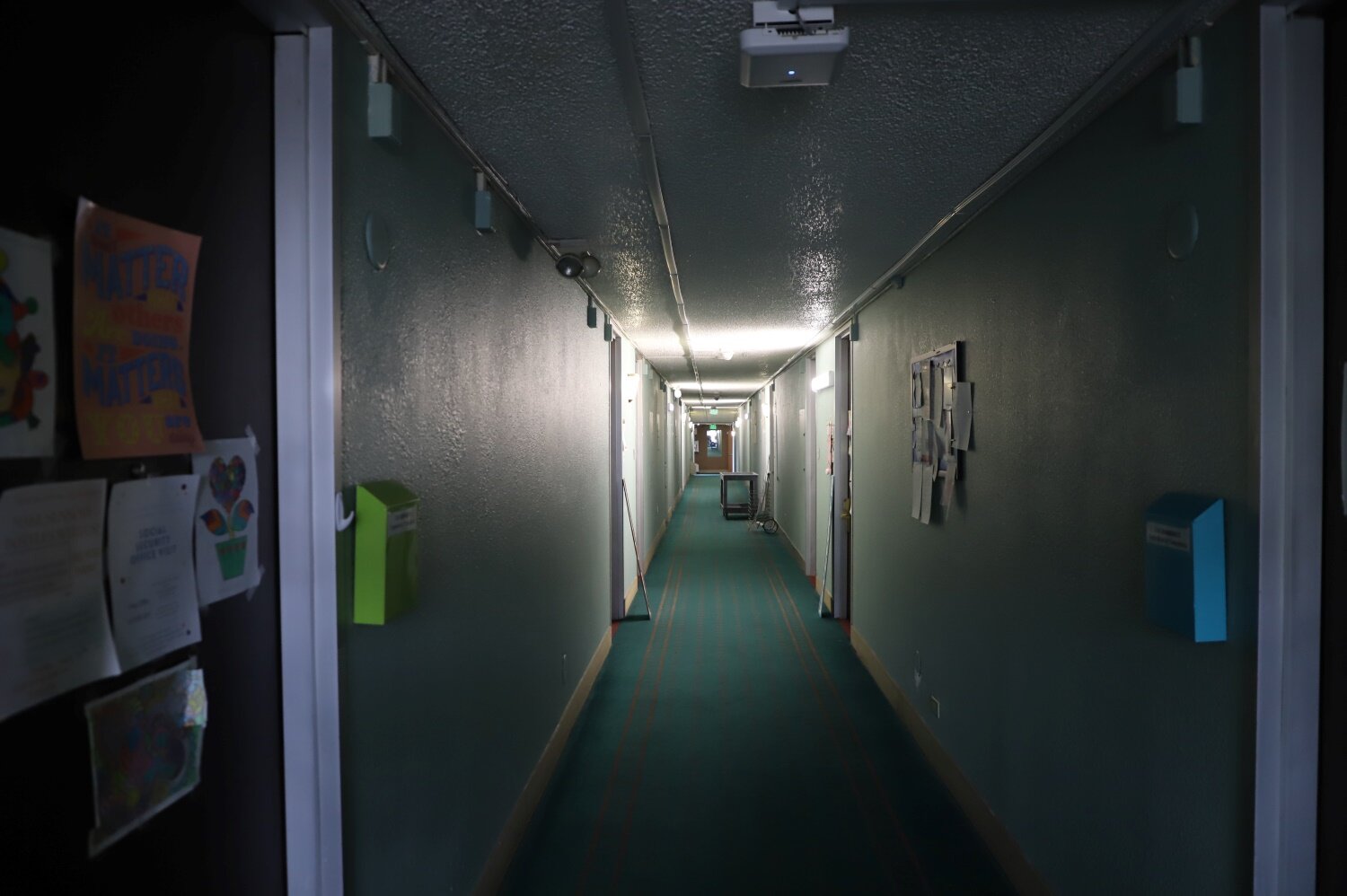As an emergency shelter prepares to close, residents and employees face an uncertain future

DENVER — After Raven has a nightmare, she puts on lipstick.
“Everything's better with lipstick,” Raven said, repeating her new motto. The lipstick gives her a sense of agency; its application is a daily pleasure that she can control. And control has been elusive in Raven’s life.
She currently lives at the Rodeway Inn Motel in Denver’s Berkeley neighborhood. Raven moved in at the end of March. The motel — adjacent to Rocky Mountain Lake Park — has functioned as a 24/7 emergency shelter for unhoused women and nonbinary individuals since August of 2020.
The Denver Housing Authority (DHA), which owns and manages nearly 4,000 affordable housing units in the city, purchased the Rodeway property with plans to develop the aging motel into more affordable housing. But development was not going to start right away, so DHA approached the Denver Department of Housing Stability (HOST) about leasing the property to the city, which could then use it as emergency shelter for unhoused women.
The shelter has been a success. Operated by The Salvation Army and the nonprofit The Gathering Place, the Rodeway shelter currently houses 76 people. It is the only emergency non-congregate shelter (i.e., guests have a room to themselves) in Denver that exclusively serves women, transgender and nonbinary people experiencing homelessness.
Soon, there will be no such places. The Denver Housing Authority is shutting the shelter down on August 24, 2023. Raven and her fellow residents are scrambling to find a new place to live.
DHA is ending its lease with HOST, which was always the plan, but instead of developing the property into affordable housing, DHA decided to sell the property and invest the earnings in other development projects.
Simply put, DHA’s sudden closure announcement caught residents and employees off guard.
Raven, who did not share her last name, said she has not been sleeping well since DHA announced its decision. She spends a lot of time worrying about her friends at the Rodeway.
“Because they don't have some of the survival skills that I have,” Raven explained. “You know, they shouldn't have to suffer for … the government or the city or whoever it is deciding to get rid of this place.”
Related Stories
Megan Devenport is the CEO of The Gathering Place. She was not exactly surprised at DHA’s decision to sell the lot, the value of which has “appreciated significantly,” Devenport estimated. (The new, two-bedroom luxury condos next to the Rodeway are renting for about $5,000/month.)
“So, my guess is that … they're going to be able to cash out pretty significantly,” Devenport said of DHA.
The disappointing part to Devenport, however, was “the speed with which it happened and the lack of transparency … around the decision of when and how to end, and without an alternative in place.”
This was a sentiment echoed by Cassandra Torres, the daytime emergency shelter program manager at The Rodeway.
“I think what we were most disappointed in is this idea that our program would be able to continue in … another facility, especially based on how successful we've been,” Torres said.
And it is not just the residents who are scrambling. The Gathering Place said because of the closure, 32 staff positions are being eliminated.
Devenport said the Rodeway’s closure is especially disappointing considering HOST had a “three-year runway” to identify a new property for The Gathering Place to operate a non-congregate, emergency shelter.
Angie Nelson, HOST’s deputy director of housing stability and homelessness resolution, told Rocky Mountain PBS that while she understands the “simplistic” view that HOST had three years to find a backup plan, the reality is more convoluted.
“Real estate deals are really complicated, and we get down a path with a facility and then find out that it's not viable and we can't keep going down that path,” Nelson said. “And so, you know, we've absolutely been working on additional facilities over the past few years.”
But none of those facilities materialized, leaving people like Raven without a home and people like Torres without a job.
Nelson reiterated that this was not due to a lack of effort on HOST’s part. “It hasn't been the case that we've been sitting here knowing about a closure and just not acting,” she said. “We've been working hard in the background and then the timeline just drastically accelerated.”
Rocky Mountain PBS reached out to DHA for comment. The agency declined a phone interview. When Rocky Mountain PBS sent questions via email, DHA did not respond.
Success of the Rodeway
The Rodeway is not glamorous. The carpeted hallways are dark, the smell is damp and Torres said the staff has battled through “tons of maintenance issues” since the motel became a shelter. But it is a shelter nonetheless, a safe place for desperate women and nonbinary people to stay for as long as they need.
Torres described the Rodeway as a “low-barrier model.” Residents do not have to be sober to live there and the Rodeway does not have a curfew. The residents are also allowed to live with their pets, which is unusual. A 2018 blog from The Salvation Army claimed that only about 40 shelters in the entire country allow pets.
Located next to Rocky Mountain Lake Park, the Rodeway Inn Motel has served as a 24/7 emergency shelter since 2020.
“I mean, you can't beat it,” said Raven, who lives with her two dogs. “You get three meals a day. You don't even really have to do much except just take care of your room.”
Raven is unemployed. She says she cannot work because of issues with her back and knees. She moved into the Rodeway to escape a violent relationship. Her ex, she explained, used a taser on her and choked her. She credits The Gathering Place for helping her back on her feet.
Since 2020, more than 25% of residents who exited the Rodeway did so to move into stable and/or permanent housing, according to data from the Homeless Management Information System (HMIS), which Devenport provided. Compare that to the Samaritan House, a women-only congregate shelter operated by Catholic Charities: less than 1% of residents who exit the Samaritan House move into permanent housing.
“People need to speak up and say that we don't need to lose any more places, especially for women, transgender and nonbinary [people],” Raven said.
When the Rodeway closes, Raven only has so many options. She said she has been “squirreling away little snacks” in case she ends up on the street. Some other Rodeway residents have approached Raven about pooling money to buy a vehicle and stay at one of Denver’s safe parking sites.
“And I really don't think I want to go to any of the other shelters,” Raven said. “I've heard too many stories about them, about what happens to women. I’d rather [live in] a tent — me and the outdoors.”
She might even move back in with her ex, the one who tased her. “No matter how much I've been abused, it's automatic: go to the last person,” Raven said. “Because at least that way I know the evil that is going on in that person's mind.”
Better the devil you know, Raven concluded. “Somebody else can be worse.”
The improbable, byzantine journey to find housing
Angela Browne is another resident at The Rodeway Inn. She has lived at the motel for close to two years. Browne said she has a degree and even worked for the city in the past but was unable to save up for the income requirements many Denver landlords have in place (landlords often require tenants’ monthly income to be at least three times the rent amount).
Browne, who no longer works for the city, is hoping that she will qualify for a housing choice voucher, which DHA operates on a lottery basis. The vouchers are restricted based on income, meaning if you make over a certain amount, you will not qualify for a voucher. This is part of the reason Browne has not gone back to work.
But a voucher does not always translate into housing. According to a report from the Housekeys Action Network Denver (HAND), just 77 of 1,000 people who received vouchers in 2021 found housing after five months. HAND said that this rate of success is “unacceptably low.”

Angela Browne has lived at the Rodeway for close to two years. Here, she stands in front of her favorite mural at the motel: a Koko Bayer mural that reads "hope."
The unfortunate reality is that people in Browne’s situation are used to waiting: HAND interviewed more than 800 unhoused people for its report, titled “Pipe Dreams and Picket Fences,” and found that respondents have been on housing waitlists for an average of 2.4 years.
Browne is frustrated with the lack of options. She said, “the way people are being housed is not proper.” Even the affordable housing the city is building is not affordable to people like her who do not have much of an income, she added.
In Denver, city leaders recently celebrated the opening of more than 70 affordable apartments for unhoused individuals. The “Valor on the Fax” community has 1-, 2- and 3-bedroom units that are available for people earning up to 30% of the area median income (AMI). For a one-person household in Denver, 30% AMI is $24,650 a year.
Other projects are underway, too. About a third of the units at the Northfield Flats complex in Central Park will house people at or below the 30% AMI mark. Developers broke ground for that complex in April. And in Denver’s South Park Hill neighborhood, the dorms of the former Johnson & Wales campus are being converted into affordable housing, but only 10% of the units are reserved for people at or below the 30% AMI mark.
Moreover, demand continues to outweigh supply. According to HAND’s report, which you can read here, “only 29 affordable and available apartments exist for every 100 people at or below 30% AMI” across the state.
A major setback for a vulnerable population
The Rodeway’s closure is a huge blow to a population that is already disproportionately impacted by poverty and homelessness. Women are more likely to live in poverty than men, and the rates of poverty are higher for women of color: a recent report from the National Women’s Law Center found that 19% of Black women — nearly 1 in 5 — live in poverty.
The data are similarly bleak for LGBTQ+ people. For example, PBS NewsHour reported that the number of transgender people experiencing homelessness increased by 88% between 2016 and 2019. The COVID-19 pandemic made matters worse.
Without The Gathering Place operating the Rodeway, many of the residents will likely make their way to other shelters, which are operated by organizations (many of them faith-based) that Devenport said are “not as skilled in working with trans and nonbinary folks.”
“Women and trans folks — trans folks especially — are overrepresented in the unhoused population,” Devenport said. “And if we chose first to prioritize the needs of the people who are most at risk and most vulnerable and most overrepresented, the potential upside is much higher than sort of an all-comers approach.”
Now, it is mostly a waiting game at the Rodeway. Employees whose positions are being eliminated are starting to look for new jobs, and the residents are trying to make plans from the comfort of the motel while they still can. Devenport is curious if DHA will provide vouchers for the residents who are, in essence, facing eviction (DHA did not respond when asked about vouchers).
Raven, meanwhile, is mostly trying to keep herself occupied. She will often create art when she feels stressed. In the past, Raven painted rocks and gifted them to the shelter’s employees as a way of saying thank you. Raven painted another rock for Devenport after she learned of the motel’s impending closure. Devenport began to cry.
“And I didn’t mean to make her cry. I wanted her to know that, you know, we’re all good,” Raven said. “We just need some way to get another helping hand out of the fire, because somehow we just got dumped on again.”
Kyle Cooke is the digital media manager for Rocky Mountain PBS. You can reach him at kylecooke@rmpbs.org.


